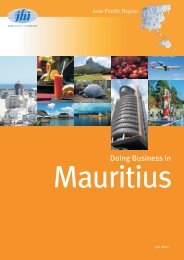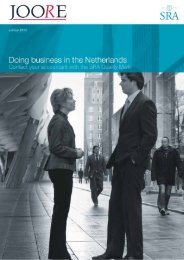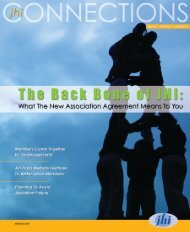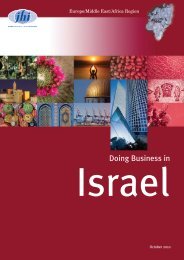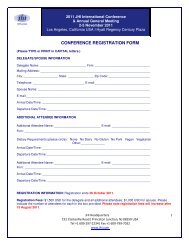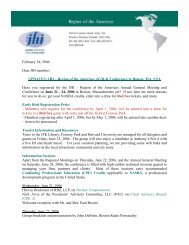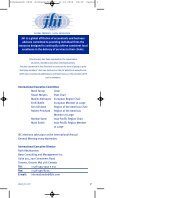Doing Business in - JHI
Doing Business in - JHI
Doing Business in - JHI
Create successful ePaper yourself
Turn your PDF publications into a flip-book with our unique Google optimized e-Paper software.
<strong>Do<strong>in</strong>g</strong> <strong>Bus<strong>in</strong>ess</strong> <strong>in</strong><br />
Liechtenste<strong>in</strong><br />
Income tax<br />
Taxable sources of <strong>in</strong>come are the net profit from selfemployed<br />
work, the salary of an employee, donations<br />
from foundations (if taxed as hold<strong>in</strong>g company),<br />
pensions and capital ga<strong>in</strong>s. Interest payments, dividend<br />
<strong>in</strong>come and loans are tax-free.<br />
Tax burden<br />
Because of the peculiarities <strong>in</strong> the Liechtenste<strong>in</strong> tax<br />
system, it is difficult to compare the tax burden with<br />
foreign countries. The highest tax rate of 16% is reached<br />
at an <strong>in</strong>come of CHF 350,000. The follow<strong>in</strong>g example will<br />
provide you a good idea about the Liechtenste<strong>in</strong> tax<br />
dimensions:<br />
through a CHF 100,000 residential build<strong>in</strong>g support and a<br />
CHF 500,000 bank loan. Cash and other assets amount to<br />
CHF 250,000. The tax burden for this family amounts to<br />
roughly CHF 12,575 or 8.3% of the gross <strong>in</strong>come.<br />
Example:<br />
A family with 2 children earns a gross <strong>in</strong>come of CHF<br />
150,000. The family owns a flat (purchase price: CHF<br />
700,000, tax relevant valuation: CHF 350,000) f<strong>in</strong>anced<br />
Pensioner tax<br />
The pensioner tax 7 is an expense-based form of taxation<br />
that can be chosen by people liv<strong>in</strong>g or hav<strong>in</strong>g residence<br />
<strong>in</strong> Liechtenste<strong>in</strong> without work<strong>in</strong>g there.<br />
For the plann<strong>in</strong>g of a domicile, Liechtenste<strong>in</strong> can only be<br />
considered <strong>in</strong> very few cases. This is due to the tight<br />
restrictions to obta<strong>in</strong> a residential permit. Further to this<br />
the pensioner tax is not really attractive.<br />
7<br />
Art. 56 ff. tax law<br />
Real estate profit tax<br />
Real estate property is extremely limited <strong>in</strong><br />
Liechtenste<strong>in</strong>. Even Liechtenste<strong>in</strong> people have to justify<br />
their need to acquire real estate. From a fiscal viewpo<strong>in</strong>t<br />
the hold<strong>in</strong>g of real estate is privileged. However, if real<br />
estate is for sale after a very short hold<strong>in</strong>g period, a high<br />
real estate ga<strong>in</strong> tax is due to prevent speculative<br />
motives. Everyone who realises capital ga<strong>in</strong>s through the<br />
sale of local real estate is taxable <strong>in</strong> Liechtenste<strong>in</strong>.<br />
From the real estate ga<strong>in</strong> an amount of CHF 1,500 is tax<br />
exempt. The tax rate corresponds with the <strong>in</strong>come tax<br />
rate. If the real estate was less than three years <strong>in</strong> a<br />
person’s ownership, the rate will be doubled. If the<br />
hold<strong>in</strong>g period is between three and five years, the tax<br />
surcharge amounts to 2/3 and for the hold<strong>in</strong>g period<br />
between five and ten years an additional 1/3 has to be<br />
paid.<br />
PAGE 22 |<br />
DOING BUSINESS IN LIECHTENSTEIN



